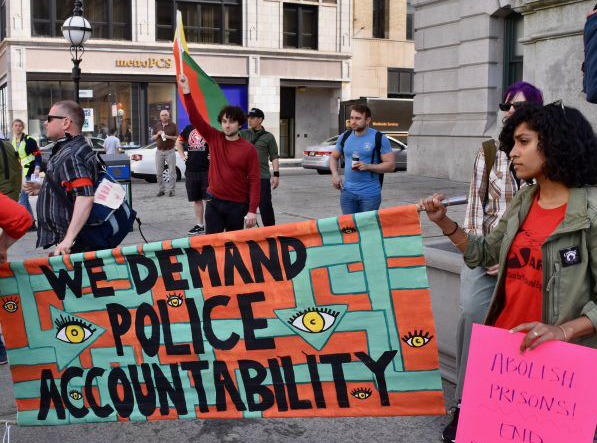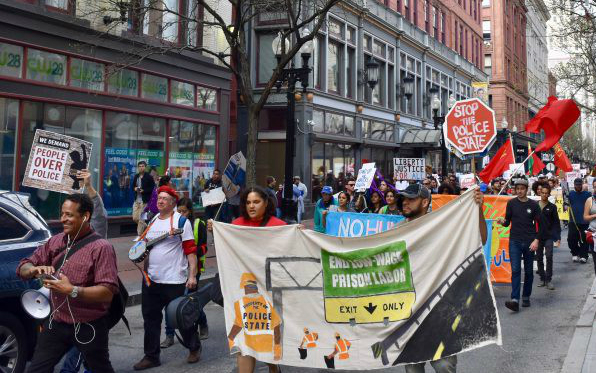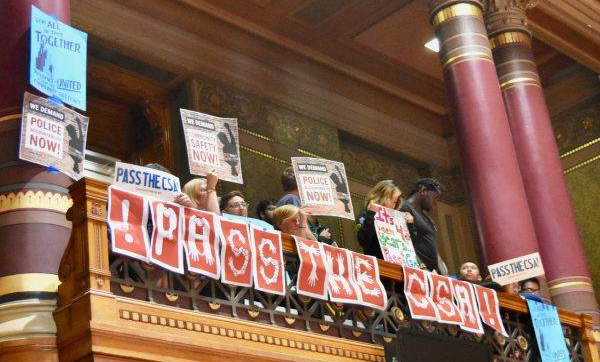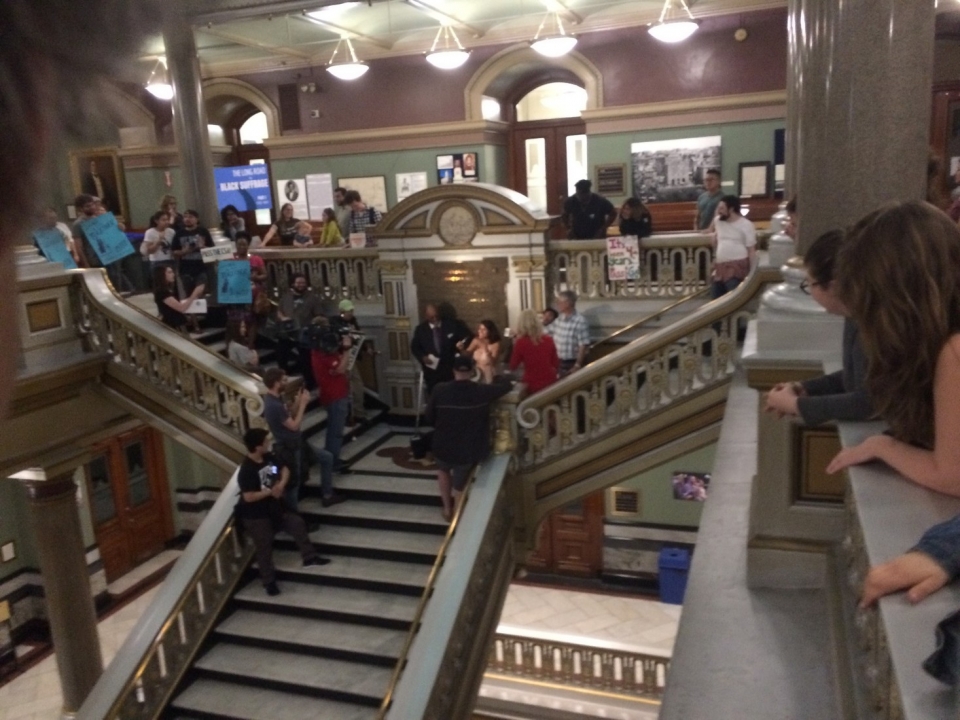
Community groups demonstrated for the passage of the Community Safety Act. Steve Alquist / RI Future
After a five-year campaign, Providence, Rhode Island passed one of the country's most progressive ordinances on policing.
Linda was only a high school senior when the Providence City Council appointed her to a working group charged with finalizing language for the proposed “Community Safety Act”—an ordinance to hold police accountable and reduce racial profiling in Providence.
At stake was five years of work and hours of negotiations by community organizations, including AFSC, and local police. The City Council had passed the ordinance at first reading but created the working group when the Fraternal Order of Police—which had previously declined to take part in negotiations—insisted on a seat at the table at the last minute, postponing a necessary second vote on the measure.
Across the table from Linda sat the Providence police chief and the president of the police union. To her left sat a city councilor. Linda was one of three community members of the working group. And it didn’t take long for the room to wake up to the fact that this young woman knew this ordinance backwards and forwards, knew what compromises community members had already made to advance the proposal, knew what her community needed out of this, and was a creative thinker open to making the document work for all involved.
Linda is a member of the Providence Youth Student Movement (PrYSM), a group that serves mostly South East Asian youth and queer youth of color. She had been working on the campaign for the Community Safety Act throughout her whole high school career—and she wasn’t about to see it go down the drain because of police resistance to it at the last minute.
In many ways, Linda embodies the power and driving force behind the recent passage of the strong, comprehensive ordinance in Providence that takes on a range of issues in policing, from stop-and-frisk to a lack of protections for people who lack proper documents.

The work on the Community Safety Act traces back to the early 2000s, when PrYSM, Direct Action for Rights and Equality, Olneyville Neighborhood Association, and AFSC were part of a statewide effort to enact legislation that would address racial profiling; the so-called “gang database” maintained by police; collaboration between police and U.S. Immigration and Customs Enforcement (ICE); and more. But each year, our group met resistance from police, who were reluctant to accept civilian oversight of their work and who rejected the idea that racism in any way influenced their policies and practices.
Each year, people who were less directly impacted by these discriminatory police practices negotiated away more and more pieces of the state legislation to get a bill that police would accept. In 2013, frustrated by both the process and the results, our coalition members walked away from the table and decided to campaign for a city ordinance in Providence instead.
Over the next year, we met with young people, parents, grandparents, and others living in heavily policed neighborhoods to learn more about how people experience the police. We talked with community members about what they wanted in an ordinance to protect them from abuses of power and to create more police accountability to the community that employs them. We researched best practices across the country on racial profiling, police/queer/trans/gender-nonconforming encounters, interpretation, protections for undocumented immigrants, and the gang database.
On June 19, 2014—Juneteenth—we submitted our first draft of the ordinance for the city of Providence. Then began the political process of building support for the ordinance. Our group received funding from the Third Sector Foundation as part of their initiative to address root causes of poverty, and we become known as the STEP UP Network.
We repeatedly met with city councilors to address their concerns. We met with the public safety commissioner and chief of police. When we couldn’t get the mayor’s attention, we showed up at events he was going to until he agreed to work with us. And we met with other groups that were interested in building a popular movement, led by people who feel police presence in their lives every day, supporting the ordinance across the city. Together we knocked on doors in wards where councilors were undecided, phone banked, and showed up at public events. Eventually, local media began covering our efforts.

Momentum was building across Providence. Support of our efforts were visible for all to see at the PRONK Festival Parade, one of the most popular and well-attended events in the city, in October 2016. The parade was full of people carrying signs calling for passage of the Community Safety Act, and crowds of spectators cheered them on in support. It was in marked contrast to our first appearance at the parade just a year before.
What started small had become a big citywide movement backed by a broad spectrum of individuals, community groups, artists, and businesses with youth of color in the lead.
In the three years since we introduced our proposal, there had been over 30 drafts of the ordinance. Each and every one of those involved a delegation meeting with other stakeholders (police, mayor’s staff, city councilors, city solicitor), then bringing the results of those negotiations back to the full group for discussion, then a return to the bargaining table to work some more.
Our STEP UP Network identified our core points and held our ground on those demands throughout the negotiating process. We were not willing to comprise on those core issues, including language on the gang database; police documentation of pedestrian and traffic stops that both enable statistical tracking and make it easier for people to file grievances; the revival of the Police External Review Authority; protections for people who are gender queer; requirements for interpretation; and protections for passengers in cars stopped for traffic violations.

The six weeks leading up the final passage of the ordinance this year were a roller coaster ride, but in the end, we agreed on language that moved us closer to stopping racial profiling; changing how police interact with members of our community, especially young people, immigrants, and people of color; and holding law enforcement accountable to the public.
The ordinance includes:
-
Prohibiting police from using race, ethnicity, color, national origin, gender, gender identity and/or expression, sexual orientation, and other characteristics as a reason to suspect someone of a crime.
-
Mandating how police document traffic and pedestrian stops and make that information accessible to people who are stopped.
-
Requiring police to establish policies regarding the use of dashboard cameras, body cameras, and any other devices.
-
Prohibiting police from interfering with, or intimidating, members of the public who are recording audio or video of police activity in any place that individual has a legal right to be.
-
Requiring public notice of police collaboration with other agencies, including Immigration and Customs Enforcement, and prohibiting police from cooperating with ICE detainers.
-
Requiring police to tell drivers why they were stopped before asking for any documents, and mandates that police can only ask for driver’s license, car registration, and proof of insurance, unless they have probable cause of a criminal offense.
-
Requiring police to inform individuals of their right to refuse consent to the search. Searches must be performed by an officer of the same gender identity as the individual being searched, and the police department will develop public policies and protocols for how officers will conduct searches of transgender and gender non-conforming individuals.
-
Prohibiting the use of several criteria, including association and race, as factors for adding someone to the gang database as well as creating ways for individuals to inquire whether they are on the “gang list” and to be informed by a written notice within 10 days. The notice will explain the right to appeal and the process to appeal the individual’s inclusion on the “gang list.”
Our task now is implementation, which will require hard work by community members and police. The Community Safety Act ordinance goes into effect Jan. 1, 2018. There are still plenty opponents of the ordinance who would prefer that it quietly fade away and a few who want to actively undermine it—and continued oversight by community members is crucial.